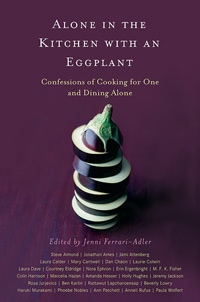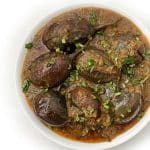When I first heard of Jenni Ferrari-Adler’s new book, Alone in the Kitchen with an Eggplant, I was intrigued. The second I found out it contained essays from a bunch of food writers on the topic of cooking for oneself and dining alone, I knew I had to immediately get myself a copy. And boy, am I glad I did. With some of my personal favourite writers like M. K. Fisher, Ann Patchett and Haruki Murakami, this treasure trove of food essays is a welcome relief from the usual array of cookbook tomes we seem to have been flooded with lately. Most stories comprise of the writer’s need to eat simple, comforting food when they’re by themselves, which only proves that no matter how much of a foodie you may be considered, when it comes to choosing your favourites, it’s always the simple that’s most enticing. The book opens with an introductory chapter from Jenni herself, who co-ordinated and edited the book, and talks about her journey as a student trying to battle the solitude that came with living on her own. She reminded me of the time when I was in college, living far from the comfort and warmth of my mom’s home cooking. Till the time I decided to finally shop for fresh vegetables and try and cook some of it, I mostly survived on toast and scrambled eggs. Not because I didn’t know how to cook, but because, like many of us, I thought cooking a normal meal for myself took too much of an effort, and didn’t quite make sense. Some of my favourite stories in this book include Laurie Colwin’s love for the eggplant when dining alone, and Laura Dave’s take on how to cook in a tiny New York apartment. I also truly enjoyed the simple writing of Haruki Murakami, who narrates the funny story of a lonely man making spaghetti for one whole year. And of course, being a big fan, how could I not enjoy M. K. Fisher’s essay on how being a food writer results in her not being invited to most dinner parties. It’s funny to note that many of the writers, have sometime in their lives detested spending time to cook for them selves. Whether we like it or not, most of us have found ourselves eating, if not cooking a meal alone. You may not enjoy it, but find yourself having to do it. And this book is definitely something I’d recommend if you’re one of those who find it hard to pick up a skillet and turn on the stove. If, however, you do enjoy the solitary meal, I would still encourage you get yourself a copy. If nothing else, it would prove a great read over coffee after dinner. My heartfelt thanks to Jenni for taking the time out of her busy schedule and let me interview her. And now, without further ado, I’ll let you get to know Jenni on a more personal note: I couldn’t be happier with the book, the contributors, their essays and recipes, the cover. The publisher has been wonderful. I feel very lucky. The response has been fabulous too. I knew it was an accessible and fun idea but I didn’t necessarily think places like the Washington Post and the LA Times would cover it so that’s been really exciting. The main thing is that it seems to be finding its readers, which is so deeply gratifying. And as an extra-special bonus, I saw someone reading it on the train the other day. He was this twenty-something hipster wearing headphones. I was so excited and kind of jumping around but he was so engrossed he didn’t notice me. Apart from many established names from the food writing circuit, we also see fiction and short pieces from writers never known to have written on food. How did you come up with such a vibrant bunch? Was it intentional on your part to not just have food writers included in this book? I asked writers whose work I admired, writers who I thought would get at the subject in an interesting way. I also asked some of the funniest writers I could think of and I’m very pleased with the amount of hilarity in the book. I wanted food writers to be part, but only part, of the discussion, since cooking and eating is a big aspect of all of our lives. I wanted to assemble an eclectic, boisterous group. The book is meant to be good company for people who like to read about food and people who read to steal glimpses into the lives of others. As a graduate student, living alone away from home and most often short of resources, you understand what every night meals can be like. Do you have any words of wisdom to students in similar circumstances who’d rather have the greasy take-out pizza slice instead of a bowl of fresh pasta from their kitchen? My second year as a grad student I ordered a lot of steamed chicken and broccoli and added lemon, salt, and Tabasco sauce to it at home. That’s not wisdom, of course, just what I felt like eating. My best suggestion is to try and remember that you would want someone you love to be eating in a somewhat balanced nutritional manner. Whether we wish to accept it or not, many of us nowadays find ourselves eating alone, be it at home, or a restaurant. Do you feel dining alone is looked down upon? What would you like your readers to take away from your book? I think dining alone is pretty accepted. Remember: Other diners aren’t giving it the amount of thought you are. I just did a whole week of dining alone in some intense restaurants for a magazine article that I hope will be running soon. I absolutely loved the part in your introduction when you said that a good meal is like giving yourself a present, and yet many of us shy away from cooking for ourselves. What would you like to say to readers who find themselves staring at the refrigerator night after night, only to walk away from the kitchen without cooking anything? We don’t generally give ourselves presents, although the truffled egg toast in Amanda Hesser’s piece would be a nice way to start. Or Nora Ephron’s buttery mashed potatoes to be eaten in bed. Cooking for yourself allows you to be decadent, luxurious, and strange. What is your fondest memory of dining by yourself? Once I started working on the project I fully embraced salads with cheese, eaten with chopsticks. When was the last time you dined out by yourself? What did you eat? Just the other day I accepted a job and took myself out for a celebratory lunch at Osaka, a Japanese restaurant near where I live. Sushi restaurants are very conducive to dining solo. I had the lunch special with vegetable rolls, and toasted myself with green tea. Then I had a piece of tobiko and a piece of tamago. You majored as a fiction writer, and have more experience in writing short stories. Has this project changed your view of writing? Can we soon expect to see you dabble in food writing? I love this question. I’ve always had a weakness for confessional-style writing both in poetry and fiction. And there’s always been a lot of food in my fiction. I plan on doing more food writing and more fiction writing. Any upcoming projects we can look forward to? I have a few things on the stove, if you will, but it’s a little too early to talk about. What do you most often cook for yourself when you’re alone? Care to share the recipe with us? I now always make black beans according to Jeremy Jackson’s recipe in the book. Lately it’s all about salads and ice cream. Did I say lately? I mean every summer. Here’s a great recipe I just had last night (with friends, to be truthful); it would make a lovely meal for any number.

